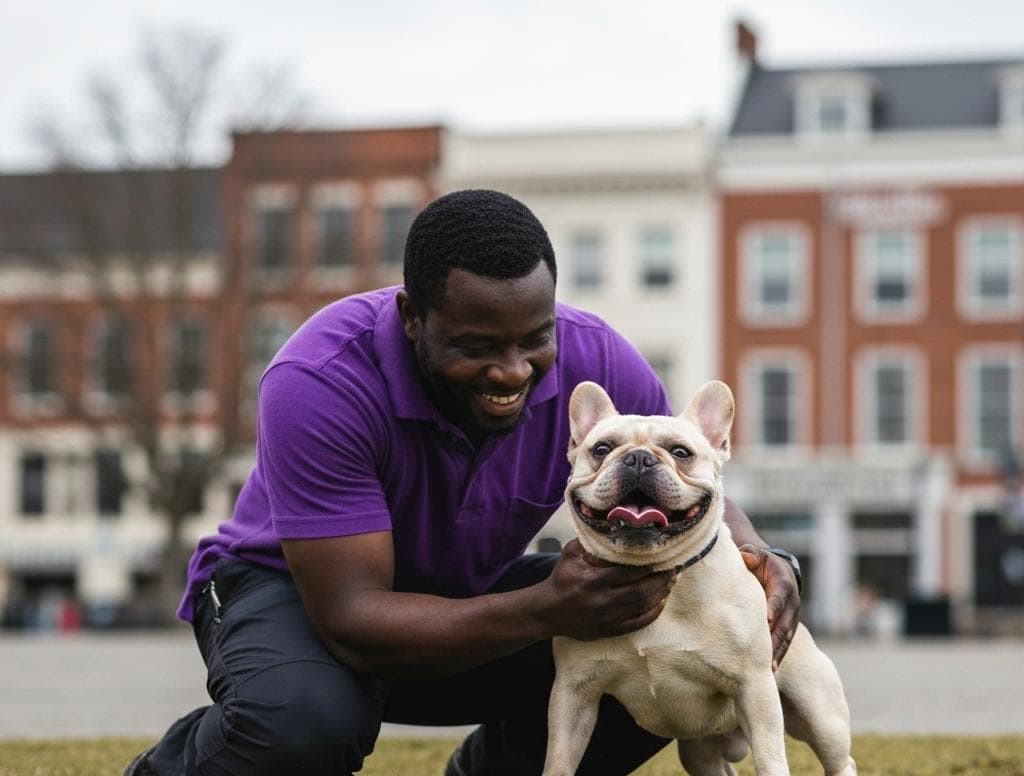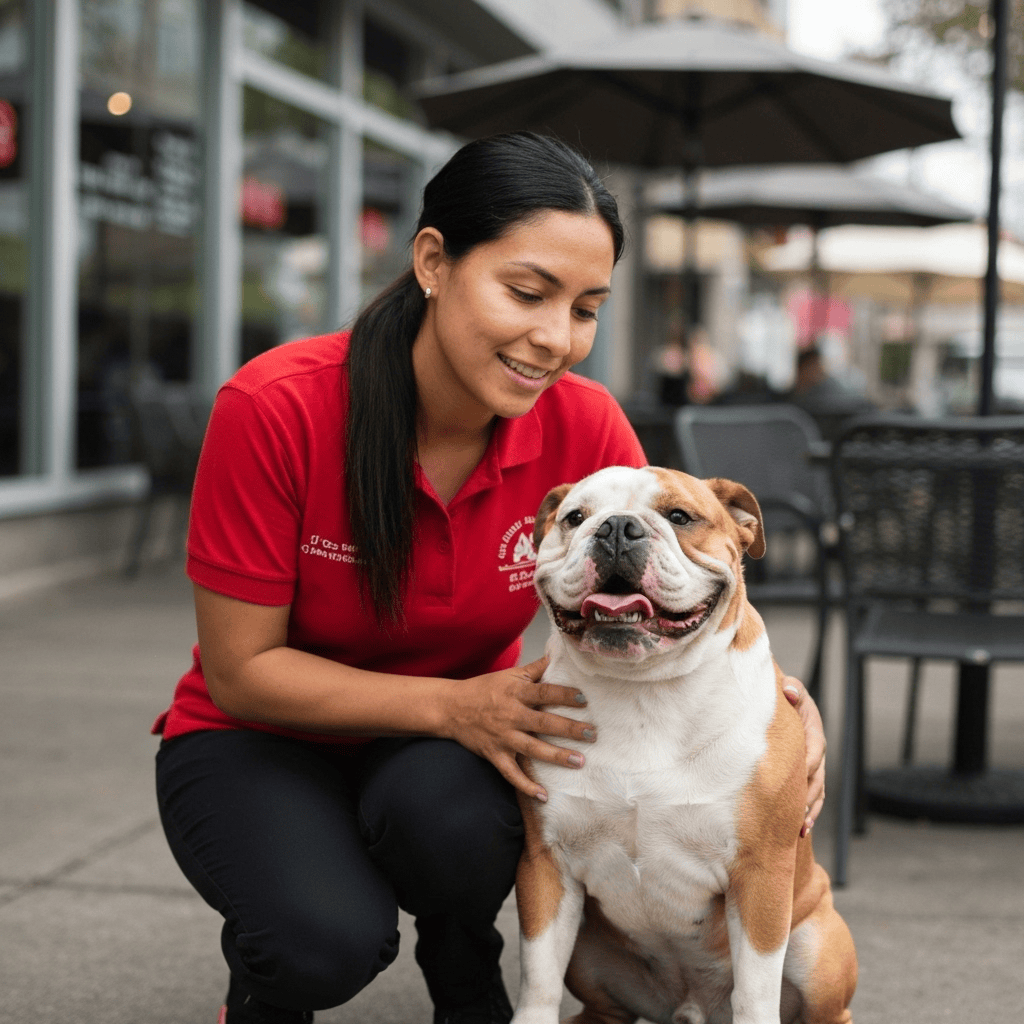Your Complete Guide to Choosing a Dog Trainer in Durham
Living with a dog in Durham means training for real life around American Tobacco Campus, Ninth Street, and busy downtown sidewalks. Good training prepares your pup for strolls at Duke Park, calm patio manners near Southpoint, and polite behavior in family neighborhoods like Hope Valley and Watts-Hillandale.
How to Choose the Right Trainer
Finding the right trainer starts with understanding what works in Durham’s urban environment. You want someone who gets that your dog needs to handle everything from cyclists on the American Tobacco Trail to weekend crowds at Durham Central Park.
Credentials matter because they help you compare backgrounds quickly. Start with this overview of dog trainer certifications, and watch for respected designations such as KPA-CTP, CPDT-KA, IAABC-CDBC, or CBCC-KA. But certifications alone don’t tell the whole story.
Look for trainers who use reward-based approaches and can give you real-world practice opportunities. Ask how they’ll tailor a plan for your specific goals, whether that’s puppy training, leash reactivity, separation anxiety, or therapy dog preparation. And if you’re planning to meet in parks around Durham, make sure they understand local leash rules and know how to keep sessions safe around other dogs and people.
Common Dog Training Methods Explained

The most effective programs focus on positive reinforcement training that rewards the behavior you want to see more often. This approach works particularly well in Durham’s busy environment because it builds your dog’s confidence rather than shutting them down.
For behavior challenges like fear, reactivity, or aggressive incidents, good trainers use behavior modification techniques. These methods include desensitization and counterconditioning, which basically means changing how your dog feels about triggers before asking them to act differently. It takes patience, but it creates lasting change.
Puppy classes are especially important in a city like Durham. They focus on socialization, potty training, basic obedience, and gentle leash training so young dogs learn to settle in public and handle new sights and sounds calmly.
Stay away from trainers who rely on fear, pain, or intimidation to get results. Those old-school methods might look impressive in the moment, but they often create more problems down the road and can damage your relationship with your dog.
Average Cost of Dog Training in Durham (Updated for 2025)
Training costs depend on several factors: the trainer’s experience, session length, and whether you choose in-home visits, group classes, private lessons, day training, or board and train programs. Here’s what most Durham and Durham County dog owners can expect to pay:
| Service Type | Typical Price (Durham Area) |
|---|---|
| Group classes, 4–6 weeks | $160 – $290 |
| Private lessons, 60–90 minutes | $95 – $170 per session |
| Puppy training package, 4–6 lessons | $350 – $650 total |
| Day training, trainer works your dog 3–5 days/week | $500 – $950 per week |
| Board and train, 2–4 weeks | $2,000 – $4,500 total |
| Behavior consult for reactivity or fear | $130 – $250 for the first session |
Expect higher rates if you’re dealing with complex behavior cases, have multiple dogs, or need the trainer to travel outside core Durham neighborhoods. Many local trainers offer a free consultation or phone evaluation to discuss your goals and see if you’re a good fit before you commit to anything.
Questions to Ask a Potential Dog Trainer
When you’re interviewing trainers, here are the key questions that will help you make the best choice:
- What training methods do you use, and how do you keep sessions positive and low stress for dogs and people?
- What certifications do you hold, such as KPA-CTP or CPDT-KA, and how do you keep your skills current?
- How will you structure a training program for my goals and my dog’s temperament?
- Do you offer in-home sessions, group classes, or day training, and which option is best for us?
- How do you measure progress and decide when to add distractions like other dogs or crowded areas?
- What is included in the price, and are there travel fees or cancellation policies?
- Do you carry liability insurance, and can you provide proof of coverage if requested?
- For behavior issues, do you coordinate with veterinarians when health or medication may be involved?
- What practice should I do between sessions to help my dog maintain results?
Local Durham Resources for Dog Owners
Durham offers plenty of great spots for training and exercising your dog, but it helps to know the rules and resources available:
- Dog parks: Piney Wood Dog Park and Northgate Dog Park are managed by Durham Parks & Recreation. Check current rules and updates at Durham Parks & Recreation Dog Parks.
- Trail training: The American Tobacco Trail is perfect for practicing leash manners and calm passing of other trail users. See details at Wake County Parks ATT page.
- Nature walks: Eno River State Park welcomes leashed dogs on most trails. Check specific park rules at NC State Parks.
- Quiet training spots: Duke Forest offers peaceful, focused training opportunities for leashed dogs. Review use guidelines at Duke Forest Recreation.
- Health resources: For rabies requirements and local clinic information, start with NC DHHS Rabies Control.
- Local support: The Animal Protection Society of Durham provides shelter services and pet resources.
Durham and Durham County Rules That Affect Training
Understanding local laws helps you train effectively while staying compliant with city regulations. Durham requires dogs to be under control and leashed in public spaces except inside designated off-leash dog parks. This means you’ll need to plan recall work inside fenced areas and always have a standard 6-foot leash ready for public spaces.
City parks require leashes outside of the fenced dog areas, so factor this into your training plans. North Carolina requires current rabies vaccination for all dogs, and you must have your rabies tag available if asked by animal services officers.
If you live in apartments or townhome communities, be aware that excessive barking can lead to nuisance complaints from neighbors. Good management and mental enrichment help prevent these issues before they start.
For professional trainers, commercial training activities in parks may require permits from Durham Parks & Recreation, though private pet owners practicing basic skills don’t need permits when following posted rules. North Carolina doesn’t issue specific dog trainer licenses, but reputable professionals carry general liability insurance.

Common Questions About Durham Dog Training
How much does in-home dog training cost?
In-home sessions in Durham typically range from $95 to $170 per visit. The final cost depends on the trainer’s credentials, how far they need to travel, and what you’re working on together. Most trainers offer package deals that lower the per-session price.
Is in-home dog training worth it?
Absolutely, especially for goals tied to your home routine. If you’re working on door manners, house training, settling during family meals, or separation anxiety, in-home training lets you practice in the exact environment where you need results. It’s also helpful for dogs who get nervous or overstimulated in new places.
Can you pay someone to house train your dog?
You can hire a professional trainer to set up a potty training system and teach you the routine, but success ultimately depends on daily follow-through from your family. A good trainer will give you a clear plan for crate schedules, feeding times, and supervised bathroom breaks.
What is the 3-3-3 rule for dog training?
This is a helpful guideline for newly adopted dogs: roughly 3 days to decompress from the transition, 3 weeks to learn your household routine, and 3 months to feel truly settled in their new home. Training should match this timeline, starting with gentle structure and predictable routines rather than jumping into intensive lessons right away.
How long will it take to reach my training goals?
Basic obedience skills like sit, stay, and loose-leash walking often come together within 4 to 8 weeks with daily practice. Behavior issues like reactivity, fear, or separation anxiety typically take several months of structured steps and consistent management. Your trainer should give you realistic timelines based on your specific situation.
What should I bring to group classes?
Pack high-value treats your dog loves, a well-fitted harness or flat collar, a standard 6-foot leash, water, waste bags, and vaccination records if your trainer requests them. Leave retractable leashes at home since they make it harder to maintain good control during class exercises.
What’s the leash law in Durham?
Durham requires leashes in all public spaces except designated off-leash dog parks. City parks also require leashes outside the fenced dog areas. Always check posted rules when you enter any park or trail, and remember that leash laws exist for everyone’s safety.
Do I need a dog license in Durham or Durham County?
Licensing requirements can change, but all dogs in North Carolina must have current rabies vaccination and wear their rabies tag. For the most current information about Durham’s specific licensing policies, check with city or county animal services using the resources listed above.
What shots does my dog need in Durham County or North Carolina?
North Carolina law requires a current rabies vaccine for all dogs. Beyond that legal requirement, talk with your veterinarian about additional vaccines based on your dog’s lifestyle and the places you visit regularly around Durham.
Are dog trainers required to be licensed in Durham or Durham County or North Carolina?
North Carolina doesn’t require special licensing for dog trainers. However, many reputable professionals hold voluntary credentials like CPDT-KA or IAABC-CDBC and carry liability insurance to protect their clients.
Where can I practice off-leash recall?
Use Durham’s fenced dog parks like Piney Wood and Northgate for off-leash recall practice. Outside of fenced areas, keep your dog leashed and practice long-line recalls to stay compliant with city rules while still working on distance skills.
Which dog parks allow training around Durham?
Both Piney Wood Dog Park and Northgate Dog Park welcome training practice inside their fenced off-leash areas. Just be courteous by moving away from high-traffic zones when you’re working on focused skills that need your dog’s full attention.
What beaches and trails allow dogs for training?
While Durham doesn’t have beaches, you’ll find excellent leashed training opportunities on local trails. Try Eno River State Park, the American Tobacco Trail, and Duke Forest for practicing loose-leash walking, engagement exercises, and calm passing of other trail users.
Final Tips for Durham Dog Owners
The best trainers understand that Durham dogs need skills for real urban life, from navigating farmer’s markets to showing good trail etiquette. Look for professionals who use humane methods, offer clear pricing, and can create a plan that helps your dog succeed in the places you actually spend time together.
Remember that training is an ongoing process, not a quick fix. The right trainer will teach you skills that strengthen your relationship with your dog while making life in Durham more enjoyable for both of you.
